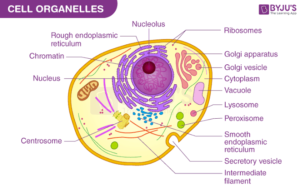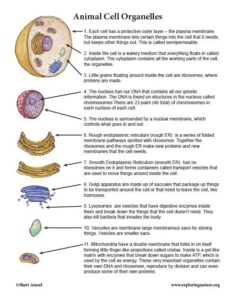Back to: ZOOLOGY 100 Level
My person, how you dey? I hope say your head dey correct and your body dey ready for another powerful Afrilearn lesson. As we dey journey deeper into the world of Zoology, today’s topic na serious matter—”Cell Organelles and Their Roles”. Just imagine say you enter a company, every worker get job. Same way, inside every cell, different organelles dey work 24/7 to keep the cell alive. You ready? Make we go there together.
Cell organelles and their roles
Imagine your body as a big company. For this company to run well, every department—security, kitchen, power supply, management—must play their part. This is exactly how a cell works. A cell is like a mini-city, and inside it, there are special workers called organelles. Each organelle gets im own role wey help the cell function well.

These organelles are not just for fancy name-calling—no be gra-gra. They are the reason your body can grow, breathe, digest food, heal wound, and even respond when mosquito dey disturb you. Understanding them is very key in Biology and Zoology.
Let’s go through the major organelles in a eukaryotic cell (which includes animal and plant cells) and their roles.
- Nucleus – The Boss Office
This is the control centre of the cell. It contains DNA (the cell’s instruction manual) and decides what the cell should do—like a principal in a school. It controls growth, repair, and reproduction. - Mitochondria – The Power House
This is where energy is produced from the food we eat. It’s like the generator or NEPA of the cell. Without mitochondria, the cell no go get energy to function. - Ribosomes – The Factory Workers
They make proteins, which are the building blocks of life. Think of them like tailors or mechanics—always fixing or building new parts for the cell. - Endoplasmic Reticulum (ER) – The Transport Company
There are two types:
- Rough ER has ribosomes on it and helps in protein production and transport.
- Smooth ER helps in making fats (lipids) and removing harmful chemicals.
It’s like a delivery van moving items to where they’re needed.
- Golgi Apparatus – The Post Office
It packages and sends proteins and other materials to different parts of the cell or out of the cell. Just like NIPOST or courier services. - Lysosomes – The Cleaners
They break down waste materials and old cell parts. Think of them as LAWMA—cleaning and recycling within the cell to prevent pollution. - Cytoplasm – The Open Space
This is the jelly-like fluid where all the organelles float. It’s like the ground of a compound where all activities happen. - Cell Membrane – The Security Gate
It controls what goes in and comes out of the cell. Like a compound gate, it blocks intruders and lets in only approved guests. - Vacuole – The Storage Tank
Stores food, water, and waste. In plant cells, it’s large and central. In animal cells, it’s small or even absent. Like the big water tank you dey use during dry season. - Chloroplast (Plant Cells Only)
This one na special solar panel for plant cells. It helps them use sunlight to make food through photosynthesis.

Let’s say your body is a bakery. The nucleus is the bakery owner, the ribosomes are the bakers mixing dough (proteins), the Golgi is packaging the bread, the ER is the van that moves ingredients, mitochondria is the oven providing heat, and lysosomes are the sweepers cleaning after baking. Without these “workers,” the bakery (cell) go shut down sharp sharp.
Summary
Cell organelles are like the internal departments of a cell, each with its specific role. From the nucleus that gives instructions, to the mitochondria that provides energy, every organelle is important. Their teamwork makes the cell function properly, just like in any successful organisation.
Evaluation
- Match the following organelles with their functions:
a. Mitochondria
b. Ribosomes
c. Lysosomes
d. Golgi Apparatus
e. Nucleus
- Why is the mitochondrion called the “power house” of the cell?
- Mention two organelles found only in plant cells and explain their roles.
You be star, no be lie! Today you’ve shown real brainwork by understanding how the inside of a cell operates like a full business organisation. Keep this energy going, and trust Afrilearn to always bring you lessons that turn your smarts into superpowers. Next class go sweet die—so hold tight and keep pushing. Na you get this!
